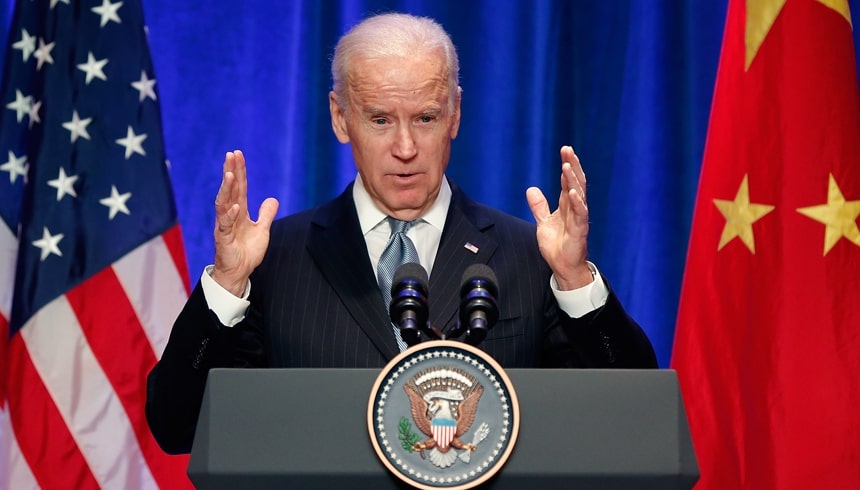U.S.-Asia Business
US-China Market Watch: Biden Possibly to Lift Tariffs, China Cuts Down Quarantine Time
By

Your monthly roundup of the latest US-China business and industry news.
Biden to potentially lift China tariffs
United States Treasury Secretary Janet Yellen and China’s Vice Premier Liu He held a virtual meeting to discuss the challenges facing the global economy, with the Chinese side describing the call as “constructive.” During the meeting, both sides agreed they needed more policy coordination to combat rising concerns of a global recession.
Although Yellen did not mention tariffs specifically, the call comes on the heels of reports that U.S. President Joe Biden may lift some Trump-era tariffs on China to help curb inflation. Last month, Yellen said that the Biden administration was looking to “reconfigure” tariffs that had hurt U.S. consumers and businesses.
Sources say that Biden is also considering a new probe into industrial subsidies that could lead to heftier duties on tech and other areas tied to national security concerns. The timing is subject to shift, but such a move would be Biden’s first major policy change between the U.S. and China.
Additionally, the Wall Street Journal reports that a proposed tech bill that would allocate $52 billion to boost U.S. semiconductor manufacturing has been updated to prevent “adversarial countries” such as China from benefitting. Should companies be building or expanding semiconductor manufacturing facilities in a so-called adversarial country, then they would be unable to receive government subsidies. Details are still being hashed out ahead of the Senate vote.
China cuts down quarantine for international travelers
China’s National Health Commission said that it was halving the mandatory quarantine time for international arrivals to one week, signaling a potential loosening of COVID restrictions. Travelers now need to spend only seven days in a government-sanctioned quarantine facility, followed by a three-day home quarantine with regular testing.
Chinese and foreign companies have long decried Beijing’s strict COVID policies, which they say has significantly slowed business by deterring travel from Chinese investors and clients, so the announcement is welcome news to some. However, the European Chamber of Commerce in China warned that many local governments impose their own additional restrictions, and that China may maintain its COVID policies through summer of 2023.
China plans $75 billion infrastructure fund
To stimulate its slowing economy, China is planning to set up a nearly $75 billion (500 billion RMB) infrastructure fund to boost jobs and falling income among its citizens. China is expected to focus more on 5G, artificial intelligence, and data infrastructure, since the returns on traditional infrastructure projects has been lagging.
At the end of May, China had announced 33 measures aimed at reviving it’s economy, which has been devastated by COVID-19 lockdowns. The package covers “fiscal, financial, investment and industrial policies, such as not expanding curbs on auto purchases and promoting development of platform economies like cloud computing, among others.
North America officially regains title as top global box office
Thanks to exclusive theatrical releases of blockbusters like “Top Gun: Maverick” and “Doctor Strange in the Multiverse of Madness,” North America has once again regained its spot as the world’s number one box office.
China claimed the top spot in 2020 and 2021, when COVID-related theatre closures and streaming-first releases caused the North American box office to take a significant hit. However, China’s strict zero-COVID policies have led to extensive lockdowns in major metropolises like Shanghai and Shenzhen, which has taken a chunk out of China’s box office revenue. As a result, China’s box office experienced a 38% decline when compared to the same period last year, taking in only $2.6 billion in revenue. Comparatively, North America has managed to rake in $3.7 billion so far in 2022.
Despite the strong domestic performance, Hollywood films are now earning significantly less in China than during pre-pandemic times. This year, Hollywood titles have only earned $400 million in China, compared to $700 million in 2021 and $1.9 billion in 2019. Both the latest “Top Gun” and “Doctor Strange” films didn’t even receive Chinese release dates. All of China’s top earners this year have been domestic films like “The Battle at Lake Changjin II.” However, Chinese films typically do not perform well overseas: “The Battle at Lake Changjin II” earned less than $1 million, whereas “Top Gun: Maverick” earned over $544 million outside of North America.
BYD becomes world’s leading electric vehicle maker
BYD, the Shenzhen-based and Warren Buffett-backed electric vehicle maker, has surpassed Elon Musk’s Tesla as the world’s leading EV seller. BYD sold over 640,000 new energy vehicles (NEV) in the first half of this year—a nearly 315% increase in sales from the same period in 2021. In comparison, Tesla delivered about 567,000 vehicles, with its deliveries falling 18% in the second quarter due to COVID lockdowns in Shanghai.
BYD’s sales have been buoyed both by government policies encouraging Chinese citizens to cut down on carbon emissions, as well as the fact that it avoided COVID-related factory closures since many of its factories are not near COVID hotspots like Shanghai.

